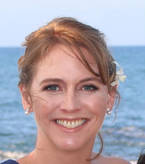|
I admit my emotions took me by surprise when I took my oldest daughter to her first day of Kindergarten this past week. I found myself blinking back the tears as we packed her snack in her new backpack; and when I saw her sitting at her little desk for the first time, I had to concentrate hard not to lose it. I was reassured by the sight of other moms and dads that seemed to be in the same boat - grappling with this major milestone. It's not just the realization that your child is growing up, it's the fact that they are on their way to becoming an individual and are starting to make their own way in the world. In this Digital Information Age, that way is constantly evolving, growing in scope, both in terms of possibilities and challenges. While the opportunities are unpredented for us to participate and succeed on a global scale, there is also competition unlike anything we have ever seen from the global community. Every parent wants to do what is best for their children and give them the skills and confidence they need to go out and succeed in the world. An education represents one of the foundational steps on that path, and as such it arguably plays the single largest role in preparing our children to participate in the global economy. Which is why stats, such as the those released <a href="http://www.upi.com/Top_News/2008/11/19/US-slipping-in-education-rankings/UPI-90221227104776/">last November </a> by the Organization for Economic Cooperation and Development (OECD), which placed the United States 18th among the 36 nations examined, are troubling. (I recognize there are so many ways to rank schools - just look at the litany of higher education <a href="http://www.library.illinois.edu/edx/rankings/rankint.html"></a> rankings - and it is often hard to draw a lot of meaningful conclusions from the results, however, they are good indicators and can help draw attention to potential issues that need scrutiny and action. Note, OECD plans to publish the <a href="http://www.oecd.org/document/59/0,3343,en_2649_37455_43590267_1_1_1_1,00.html">2009 edition of Education at a Glance </a>next week, Sept. 8th to be exact.) There are huge debates around exactly what changes are needed to improve our eductional systems, but one thing is constant, we need to modernize and better leverage technology to give our children every advantage to compete in this Digital Age. Broadband penetration is critical to ensure everyone has access to the global information, resources and opportunities available online. It probably isn't a coincidence that South Korea, <a href="http://www.networkworld.com/news/2008/072408-broadband-penetration-gartner-study.html?hpg1=bn">whichaccording to Gartner has a broadband penetration of 97%</a>, also moved to the top of OECD's rankings, with 93 percent of high school students graduating on time. Extending broadband into the classroom and integrating technology into curricula is proven to <a href="http://www.edutopia.org/teaching-module-technology-integration-why">improve teaching and learning </a> (take a look at the recent <a href="http://ssw.stanford.edu/">Stanford Study of Writing</a>, which found that young people today tend to write more than any other generation), it is also vital for the ongoing competitiveness of generations to come in the global economy. It extends the reach of learning, helping people of all ages get the skills and information they need when they need it. It has the potential to bring greater interactivity, personalization and relevancy into the educational process. The possibilities, like the technology itself, are endless. So, as I dropped my daughter off, I took comfort in the computer with the Ethernet cable that sat in the corner of the room and got oddly excited by the computer lab. No doubt about it, the world we live in has gone digital. It is our collective responsibility to make sure we arm our children with the technological tools they need to effectively make the most of it, then just think of where the imaginations and innovations of my kindergartner and her fellow classmates around the world are going to take us! Sarah is the author of The Sustainable Network: The Accidental Answer for a Troubled Planet. The Sustainable Network demonstrates how we can tackle challenges, ranging from energy conservation to economic and social innovation, using the global network -- of which the public Internet is just one piece. This book demystifies the power of the network, and issues a strong call to action.
0 Comments
Leave a Reply. |
Sorensen
|


 RSS Feed
RSS Feed